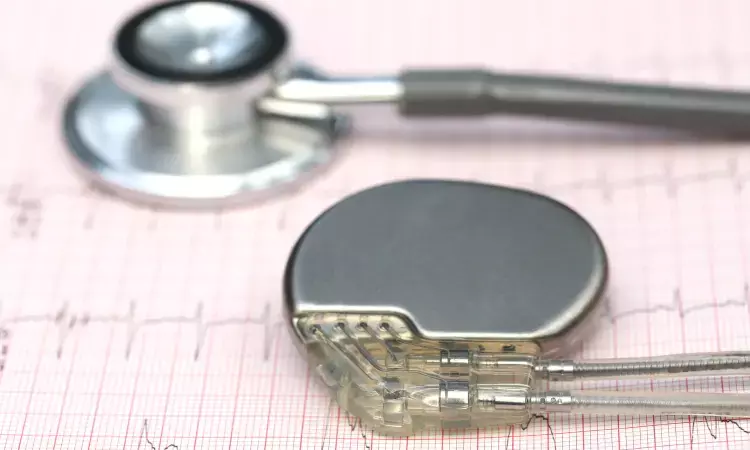- Home
- Medical news & Guidelines
- Anesthesiology
- Cardiology and CTVS
- Critical Care
- Dentistry
- Dermatology
- Diabetes and Endocrinology
- ENT
- Gastroenterology
- Medicine
- Nephrology
- Neurology
- Obstretics-Gynaecology
- Oncology
- Ophthalmology
- Orthopaedics
- Pediatrics-Neonatology
- Psychiatry
- Pulmonology
- Radiology
- Surgery
- Urology
- Laboratory Medicine
- Diet
- Nursing
- Paramedical
- Physiotherapy
- Health news
- Fact Check
- Bone Health Fact Check
- Brain Health Fact Check
- Cancer Related Fact Check
- Child Care Fact Check
- Dental and oral health fact check
- Diabetes and metabolic health fact check
- Diet and Nutrition Fact Check
- Eye and ENT Care Fact Check
- Fitness fact check
- Gut health fact check
- Heart health fact check
- Kidney health fact check
- Medical education fact check
- Men's health fact check
- Respiratory fact check
- Skin and hair care fact check
- Vaccine and Immunization fact check
- Women's health fact check
- AYUSH
- State News
- Andaman and Nicobar Islands
- Andhra Pradesh
- Arunachal Pradesh
- Assam
- Bihar
- Chandigarh
- Chattisgarh
- Dadra and Nagar Haveli
- Daman and Diu
- Delhi
- Goa
- Gujarat
- Haryana
- Himachal Pradesh
- Jammu & Kashmir
- Jharkhand
- Karnataka
- Kerala
- Ladakh
- Lakshadweep
- Madhya Pradesh
- Maharashtra
- Manipur
- Meghalaya
- Mizoram
- Nagaland
- Odisha
- Puducherry
- Punjab
- Rajasthan
- Sikkim
- Tamil Nadu
- Telangana
- Tripura
- Uttar Pradesh
- Uttrakhand
- West Bengal
- Medical Education
- Industry
Transcatheter Leadless Pacemakers viable pacing option for pediatric patients and those with congenital heart disease

USA: Transcatheter Leadless Pacemakers (TLP) may be a viable option for pediatric patients and those with congenital heart disease who cannot undergo traditional forms of pacemaker implantation, according to a study published in Circulation: Arrhythmia and Electrophysiology.
The research, conducted by the Pediatric and Congenital Electrophysiology Society, aimed to assess the safety and efficacy of TLP in children, a population that has been excluded from previous clinical trials.
The study collected retrospective data from 15 centers enrolled in the Pediatric and Congenital Electrophysiology Society TLP registry, including patients ≤21 years old who underwent Micra TLP implantation with ≥ 1-week follow-up.
Out of the 63 patients enrolled in the study 20 patients had congenital heart disease (32%) and the mean body weight at implantation was 55±19 kg, 8 patients were ≤8 years old and ≤30 kg. The TLP was implanted by femoral (87%) and internal jugular (12.6%) venous approaches.
The study concluded with the following clinical findings:
- 1.Successful implantation in 98% of 63 registry patients aged 15±4.1 years.
- 2.16% (10) of patients had complications during a 9.5±5.3-month follow-up period
- 3.Complications included cardiac perforation/pericardial effusion, nonocclusive femoral venous thrombus, and TLP retrieval/replacement due to high thresholds.
- 4.No deaths, TLP infections, or device embolizations.
- 5.Electrical parameters including capture thresholds, R wave sensing, and pacing impedances remained stable.
The study’s findings suggest that TLP implantation is safe and effective in pediatric patients and those with congenital heart disease. However, the researchers noted that further long-term prospective data are needed to confirm the reproducibility of these initial findings.
This Lead author Dr. Maully Shah added that “This is important information for clinicians who treat pediatric patients with pacing indications. The use of TLP could potentially avoid the need for repeated sternotomies, thoracotomies, or transvenous systems, which can be difficult and risky in young patients.”
Reference:
Shah M., Borquez A., Cortez D., McCanta A., De Filippo P., Whitehill R., Imundo J., Moore J., Sherwin E., Howard T., Rosenthal E., Kertesz N., Chang P., Madan N., Kutalek S., Hammond B., Janson C., Iyer R., Williams M.; Transcatheter Leadless Pacing in Children: A PACES Collaborative Study in the Real-World Setting; Circulation: Arrhythmia and Electrophysiology. 2023;0:e011447; doi: https://doi.org/10.1161/CIRCEP.122.011447
Dr. Mahalakshmi Sivashankaran joined Medical Dialogues as an Intern in 2023. She is a BDS graduate from Manipal College of Dental Sciences, Mangalore Batch 2022, and worked as a Junior Resident at VMMC & Safdarjung Hospital at the Department of Dental Surgery till January 2023. She has completed a Diploma in Executive Healthcare management from the Loyola Institute of Business Administration, developing skills in Healthcare Management and Administration. She covers several medical specialties including Dental, ENT, Diagnostics, Pharmacology, Neurology, and Cardiology.
Dr Kamal Kant Kohli-MBBS, DTCD- a chest specialist with more than 30 years of practice and a flair for writing clinical articles, Dr Kamal Kant Kohli joined Medical Dialogues as a Chief Editor of Medical News. Besides writing articles, as an editor, he proofreads and verifies all the medical content published on Medical Dialogues including those coming from journals, studies,medical conferences,guidelines etc. Email: drkohli@medicaldialogues.in. Contact no. 011-43720751


